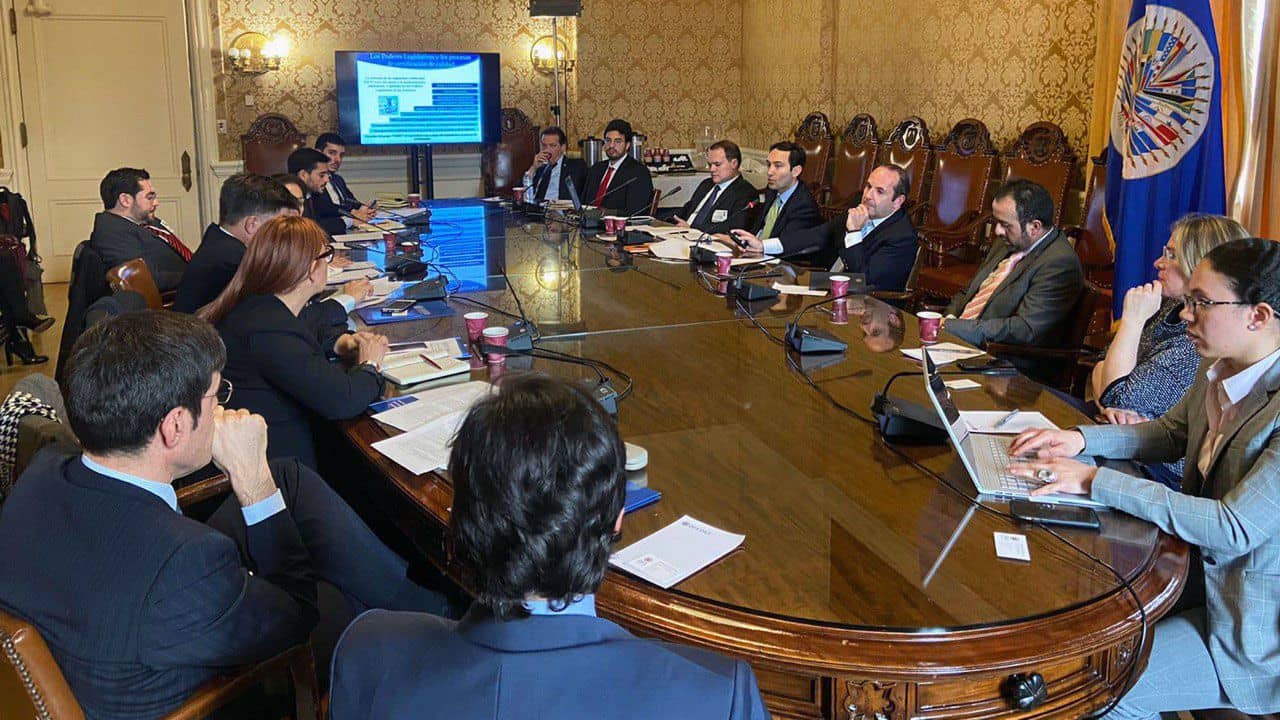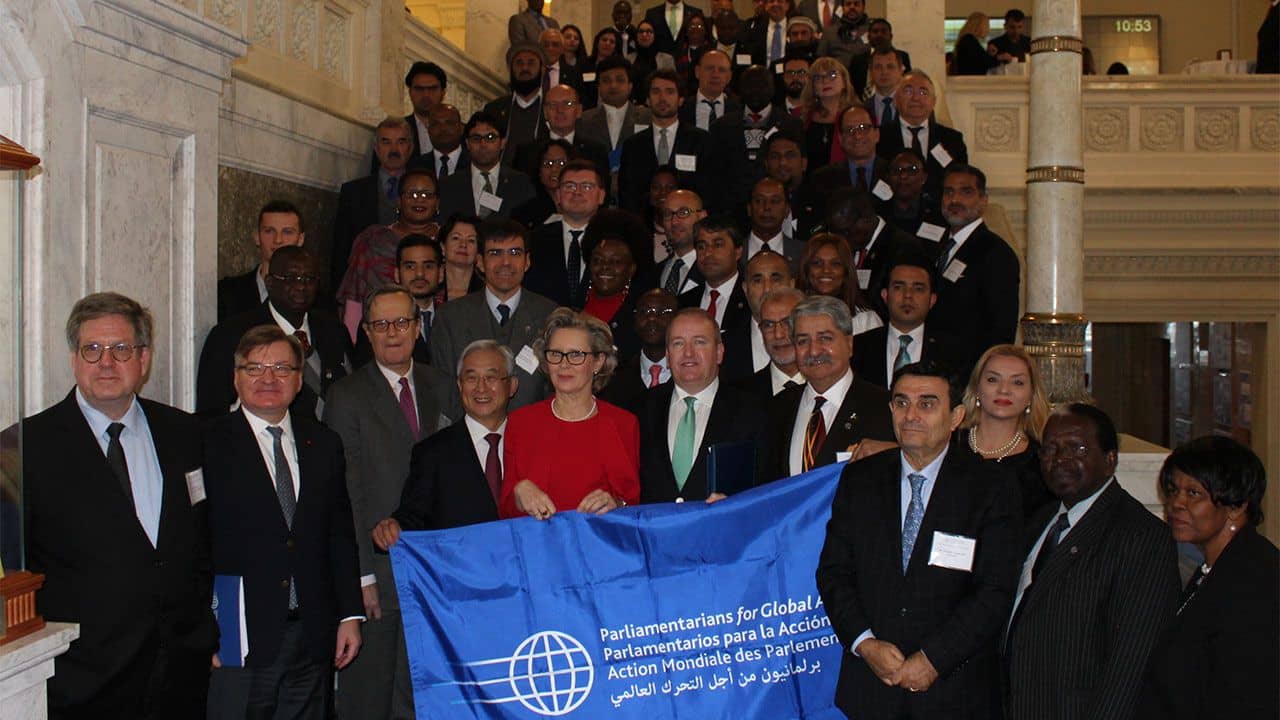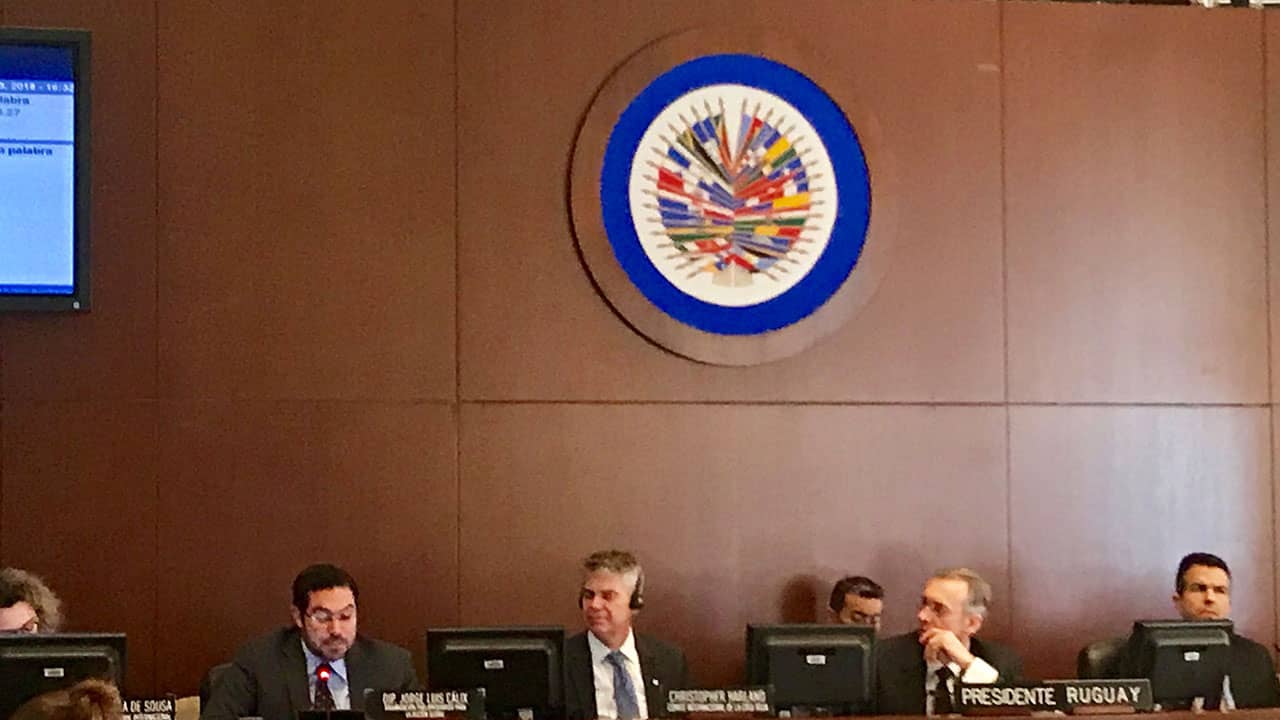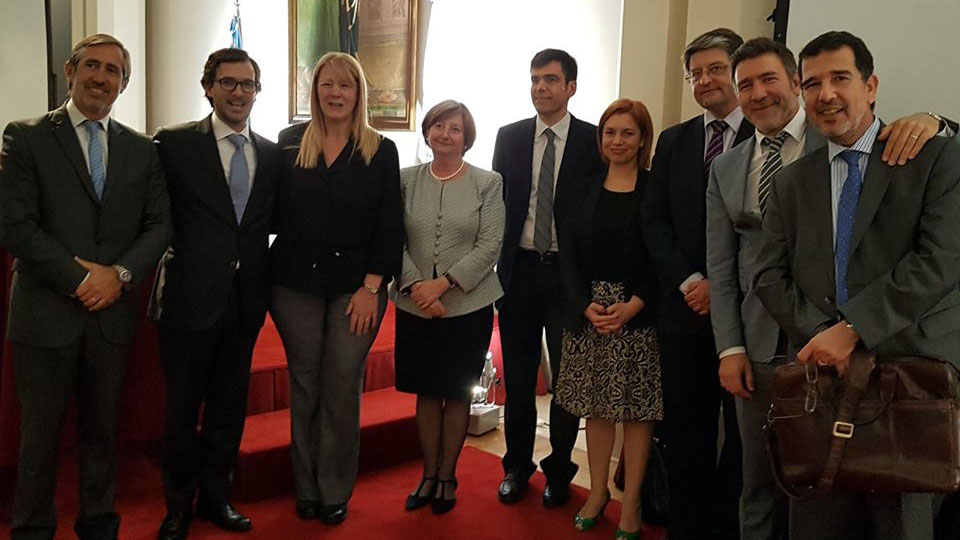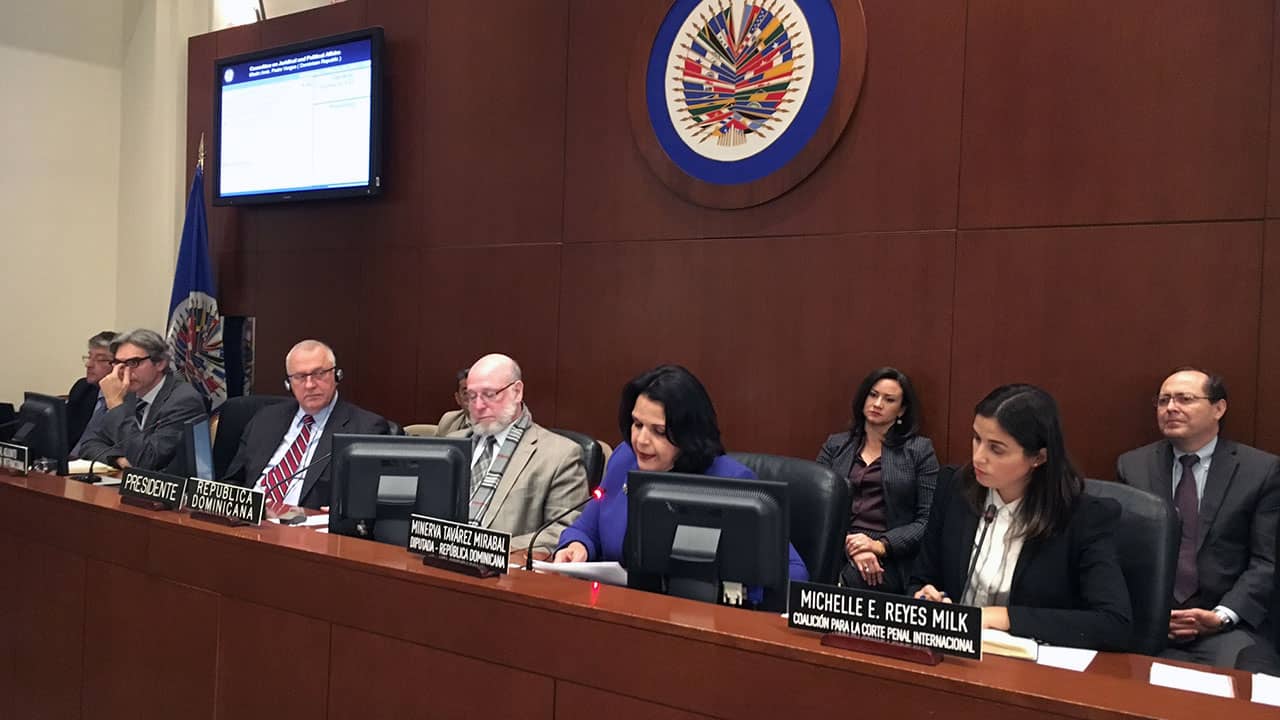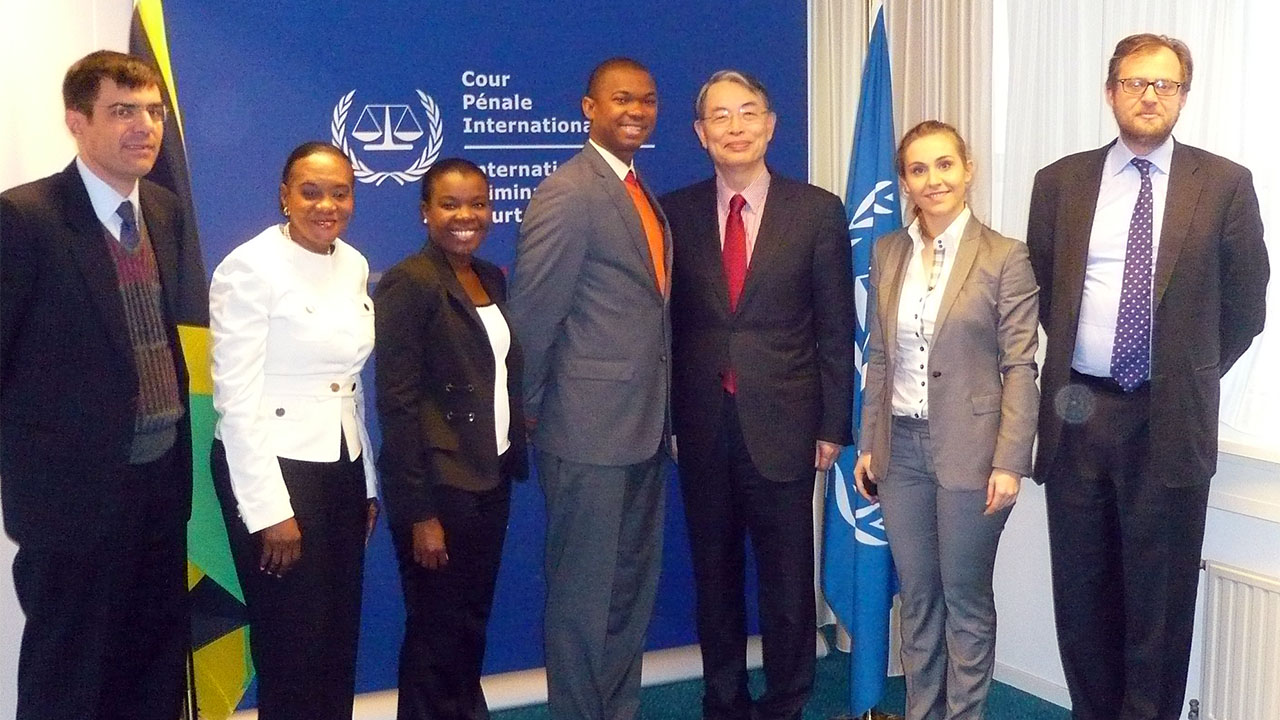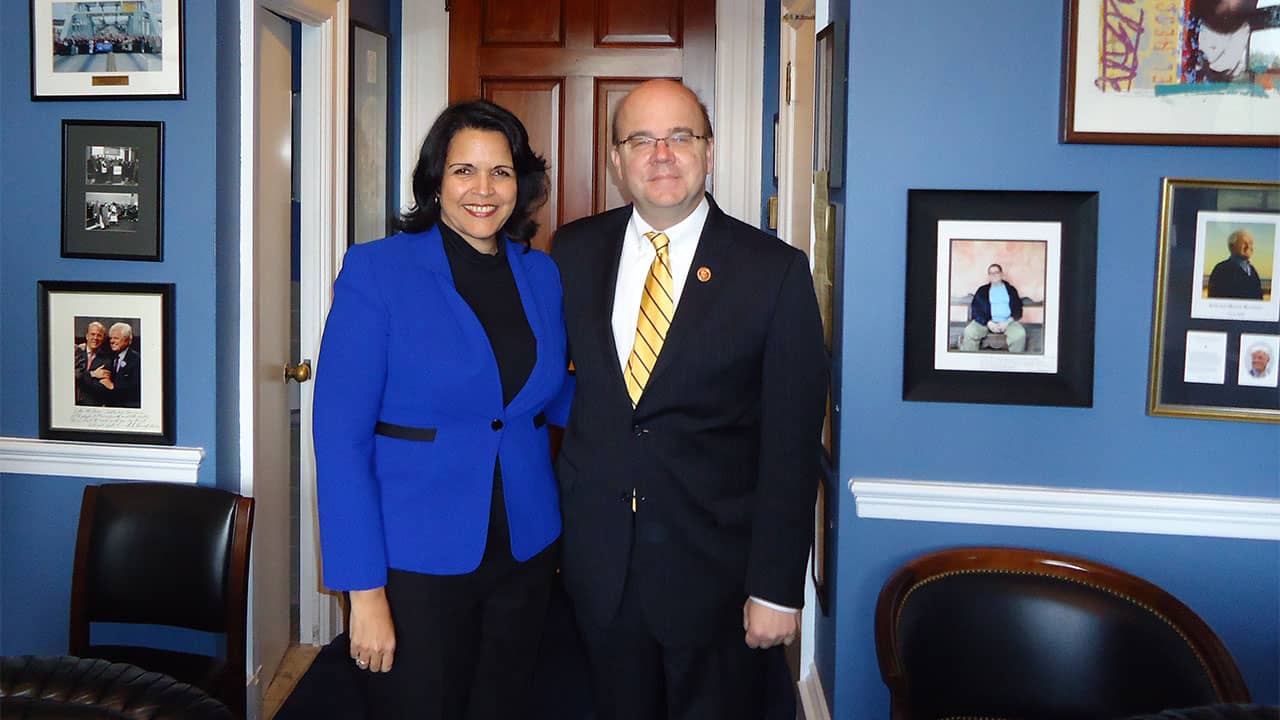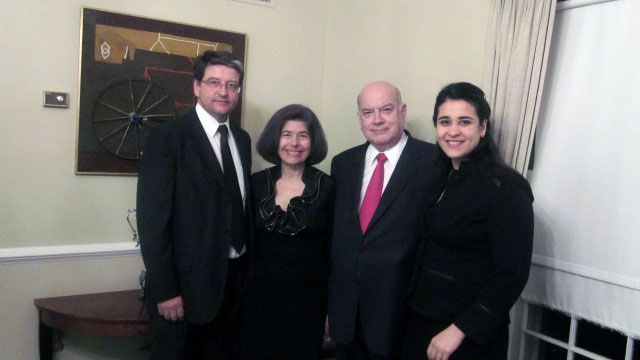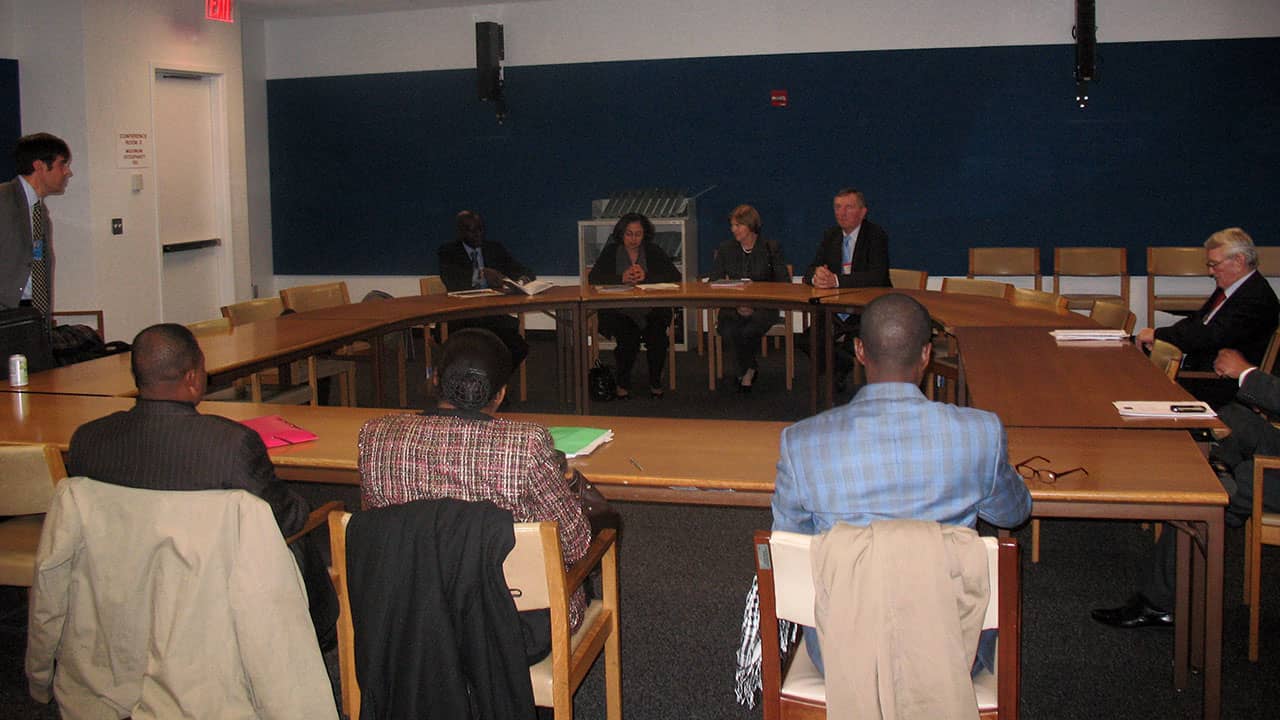Jamaica is one of the few Caribbean countries that has yet to become a State Party of the International Criminal Court. PGA has worked with parliamentarians from Jamaica since 2002 promoting the fight against impunity for the most serious crimes, and ratification and full domestic implementation of the Rome Statute.
In April 2015, a PGA Delegation met with Hon. Arnaldo Brown, MP and PGA member, in Kingston to follow up on the implementation of the Rome Statute into Jamaica’s national legal system. Hon. Brown confirmed that the draft for implementing the Rome Statute was at the Chief Parliamentary Counsel, and should be ready by July 2015.
In May 2015, this was echoed in Justice Minister Mark Golding’s comments to the Senate in which he stated that the drafting of domestic legislation, which would allow Jamaica to join the Court, was at an advanced stage and should be in place by the end of the year. PGA was informed then that the ICC Implementing Legislation was in the pipe-line of legislative reforms to be transmitted by the Chief Parliamentary Counsel to Parliament for deliberation.
After Jamaica’s general elections in February 2016, where PGA Member Hon. Arnaldo Brown was replaced by the new Minister of State and Foreign Affairs Senator Kamina Johnson Smith, PGA is now following up with the new Minister and planning a visit with a group of legislators to ensure the continuance of its past efforts towards ratification.
In January 2014, PGA had organized a high-level Jamaican parliamentary delegation visit to The Hague, lead by Hon. Arnaldo Brown, MP, and Minister of State in the Ministry of Foreign Affairs, in order for the Delegation to meet with key senior officials at the International Criminal Court, as well as at the Parliament and Ministry of Foreign Affairs of the Netherlands. Additionally, the PGA ICC team delivered technical assistance to them and Minister Brown through the transmission of a full Dossier on the domestic implementation of the RS.
At the end of May 2014, PGA learned that the Chief Parliamentary Counsel of Jamaica received from Cabinet the legislative dossier on the Rome Statute implementation, including the PGA draft and the revised Commonwealth Model Law. Ms. Denise Daley, MP participated in the Santo Domingo Workshop for the Ratification and Implementation of the Rome Statute and the Kampala Amendments where she committed to work towards the ratification of the Statute by boosting the process for the necessary implementation of the treaty.
In December 2012, Hon. Brown, MP and Minister of State for Foreign Affairs of Jamaica participated in PGA's 7th Consultative Assembly of Parliamentarians for the ICC & the Rule of Law where he expressed his strong commitment to the Rome Statute system and announced that a ratification Bill would be tabled before Parliament during the legislative year 2013-14, which commenced in October 2013.
In May 2012, PGA Member Senator Julio César Valentín Jiminián (Dominican Republic), met in Kingston with Hon. Brown, MP and a representative from the Office of the Chief Parliamentary Counsel. The purpose of this visit was to brief the Minister on PGA, its programs and, in particular, its ongoing substantive and extensive work promoting ICC ratification and to enquire into the status quo vis-à-vis ratification of the Rome Statute by Jamaica. Mr. Brown stated that a large legislative package was to be submitted in the current and following legislative sessions of parliament but that there was no guarantee that the ICC-related draft legislation would be part of the package.
See more here.
Rome Statute and Kampala Amendments of 2010
A Jamaican delegation participated in the 1998 Rome Conference where the International Criminal Court (ICC) Statute was adopted. On 8 September 2000 Jamaica signed the Rome Statute but has yet to ratify it, including both its Amendments adopted in Kampala in the 2010 Review Conference on the crime of aggression and on the use of certain weapons in armed conflict not of an international character.
A delegation from Jamaica also attended the 2010 Review Conference.
Domestic Implementation of the Rome Statute
Jamaica currently has no domestic implementing legislation pertaining to the Rome Statute. Since 2002, when the Government appointed a Working Group to analyze the issues related with the ratification and implementation of the Rome Statute, no definitive outcome has publicly emerged from the Working Group. However, the government – in its meetings with PGA Delegations in Jamaica in May 2012 and January 2014 and, at the CAP ICC sessions in Rome, Italy in December 2012 and in Rabat, Morocco, in December 2014 - has indicated that they support ratification and full implementation of the Rome Statute. During 2014, domestic implementation received close attention in parallel with the Cabinet’s consideration of ratification of the Rome Statute of the ICC, which was decided by Cabinet, as PGA learned from Jamaican parliamentary and governmental sources. As a result of these developments, fully supported by PGA Members in Jamaica, the Chief Parliamentary Counsel of the Jamaican Government has been instructed to prepare a Draft Implementing Legislation taking into account the revised Commonwealth Model Law and the experience of other States. In January 2014 PGA had provided technical input on the domestic implementation process.
Agreement on Privileges and Immunities of the Court (APIC)
Jamaica signed the Agreement on Privileges and Immunities on 30 June 2004.
Additional Agreements
Jamaica did not sign a Bilateral Non Surrender Agreement to the ICC with the United States.
Description of the ICC Process and PGA's Involvement
In Jamaica, the process of ratification was initially slated to be completed since 2007, but a determination by the Government of the time that a constitutional reform may be necessary as pre-condition for ratification has resulted in a need for further national consultations and review.
Since 2002, PGA has been working on promoting ratification of the Rome Statute by Jamaica, when a Jamaican delegation of MPs attended and addressed the First Session of the PGA Consultative Assembly of Parliamentarians for the ICC and the Rule of Law which was held in Ottawa, Canada as well as the 3rd Session in Wellington, New Zealand in 2004.
Since 2006, the Jamaican government has indicated that it wished to move forward with the ratification of the Rome Statute and it has also held parallel internal technical discussions/deliberations on proceeding forward, including on the question of whether a need exists to amend the Constitution in order to do so.
In 2007, PGA suggested to the EU to demarche Jamaica encouraging it to move forward with ratification, highlighting its unique role in the Caribbean. On 7 May 2007 the German Presidency of the EU carried out a demarche on the ICC.
As a result of a concern in some quarters in Jamaica that ratification of the Rome Statute might negatively impact its relationship with the US, PGA started working in 2008 with country officials through the Embassy of Jamaica in Washington as well as with the Speaker of the Senate of Jamaica, intensifying as evidence emerged that relations with the US would not be impaired if such action was taken.
In the continued absence of progress, PGA suggested the EU to demarche Jamaica again in 2009, encouraging it to move forward with ratification and to clarify possible misconceptions regarding the terms of reference of the ICC; the mechanisms safeguarding the Court’s independence in its procedures and the accompanying need to reinforce the system of States that belong to the Rome Statute. In 2009, the EU conducted a demarche.
Later in 2009, indications emerged that Jamaica was now leaning more favorably towards ratifying the Rome Statute but that there were still some issues pending relating to the necessary enabling legislation be put in place.
In the first semester of 2010, the EU again demarched Jamaica, encouraging ratification of the Rome Statute of the ICC. As noted previously, Jamaica participated in the Review Conference as an Observer and even though it did not make a formal statement, delegates indicated that they are very close to presenting the ratification dossier to Cabinet. During the Universal Periodic Review held in November 2010, Jamaica stated that “active consideration is being given to ratification of the Rome Statute.”
In 2011 the EU again demarched Jamaica in support of Jamaican ratification of the Rome Statute of the ICC. Jamaica reaffirmed that year its intention to ratify the Rome Statute, provided that certain bottlenecks related to implementing legislation were first overcome as they indicated that the implementation of the Rome Statute within domestic legislation was necessary, prior to ratification.
In mid-May the Council of Ministers of Jamaica approved to move forward with the ratification of the Statute but subject to its previous domestic implementation.
During 2012 and 2013, the President of the Assembly of States Parties to the Rome Statute, President Intelmann used the opportunities offered by the General Assembly’s Ministerial week to meet with ministers of non-States Parties to advance the cause of universal ratification. The President met with the Foreign Minister of Jamaica, who offered concrete timelines, announcing that the legislative process for ratification and implementation was already underway, with ratification expected by March 2013.
On the occasion of the 67th UN General Assembly Thematic Debate on International Criminal Justice and the Role of International Criminal Justice in Reconciliation, on 10-11 April 2013, Jamaica commended ICTY and ICTR for neutral and fair frameworks, especially in pursuing perpetrators from all walks of life and balancing fairness with expeditiousness. Stated support for the International Mechanism for Criminal Tribunals.
Relation to the ICC
As a member of the Organization of American States, Jamaica has supported the promotion of the International Criminal Court through the adoption of an annual resolution by the General Assembly of the OAS. For more information on the work of PGA within the OAS, click here.
As a member of the Community of Caribbean States (CARICOM), Jamaica has joined the support to the integrity of the Rome Statute and the refusal to the signing of Non-Surrender Agreements with the US, as evidence by the Statement issued by the Conference of Heads of Government of the CARICOM (2003), and through the regular statements of the CARICOM at the UN General Assembly (i.e. 2006).
As a member of the African, Caribbean and Pacific community (ACP), and as signatory of the revised Cotonou Agreement with of the ACP and European Union, Jamaica has recognized the importance of the ICC as a mechanism for peace and international justice, and has committed to promote the ratification and implementation of the Rome Statute, to seek to take steps towards the ratification and the implementation of the Rome Some Statute, and to fight against international crime giving due regard to the Rome Statute.
Human Rights Council Universal Periodic Review: During Jamaica’s review in the framework of the 22nd session of the UPR in May 2015, Jamaica received several recommendations to ratify the Rome Statute and responded in supporting these recommendations and replying that this recommendation is already in process of implementation.

